Class News
Bill Fink ’64 honored at Oxford shell christening
April 4, 2022
Bill Fink ’64 rowed for Yale during his four undergraduate years, and then went on to row for Oxford in “The Boat Race” (Oxford vs. Cambridge) in 1965, along with Harry Howell ’64 and Ed Trippe ’64. Bill rowed again for Oxford in 1968.
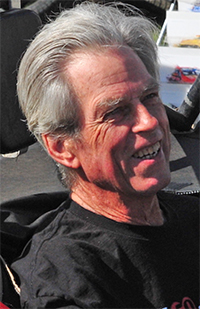
Bill Fink
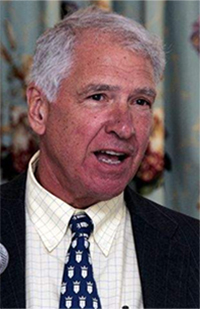
Ed Trippe
In 2020, Bill lost his life in a house fire, reported on this website.
As reported in an earlier article, Ed Trippe helped organize the christening of a new Oxford shell named in honor of Bill. Here follows Ed’s report of the christening on April 2 and the race the following day. Duncan Spencer ’62 led the christening ceremony, and is featured in the video below. Duncan rowed for Yale and for Oxford in 1963-1965. At the bottom of this page is an article by Duncan describing a comeback at Henley by Trippe, Howell, Fink, and Spencer, fully twenty-five years after they rowed for Oxford.
The Christening of the “Bill Fink”
The Embankment, London
by Ed Trippe ’64
April 4, 2022
On a brilliant Sunday afternoon on April 3 the Oxford crew and their new shell — the “Bill Fink” — were victorious with a five-length win in the annual race against Cambridge.
As many classmates will remember, Bill was tragically killed in a house fire in 2020. Last year, an alumni group of Oxford oarsmen decided to honor Bill and acquired a shell which was named after our classmate who was a legend in Oxford rowing. Yesterday, the “Bill Fink” was christened with a bottle of champagne poured over the bow by Sebastian Pearce, Chair of the Oxford University Boat Club.
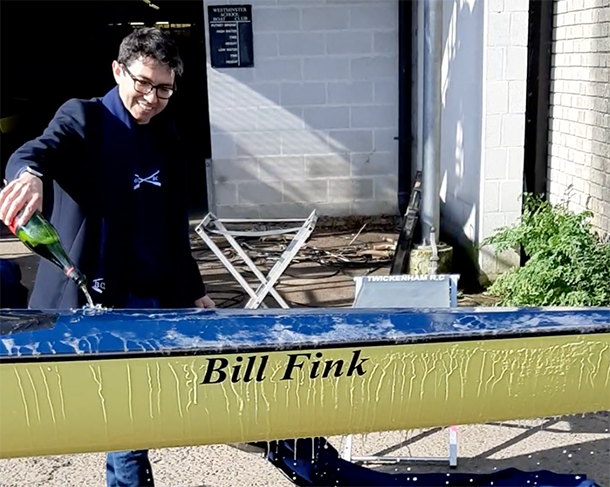
Duncan Spencer ’62, who rowed with Fink, Howell, and Trippe at Oxford in 1965, spoke at the dedication. Also on hand were Jim Rogers ’64, a veteran Oxford coxswain. Missing was Harry Howell, a key stalwart in the great Oxford 1965 boat. Blaine Krickl represented the Yale Class of ‘64 residing in London.
The Christening on Video
You can watch Duncan Spencer’s dedication and motivation in the video below.
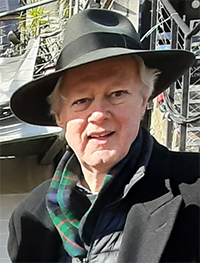
Blaine Krickl
Blaine Krickl added: “On Saturday, I went to the dedication ceremony for the Bill Fink shell in which the Oxford men raced and won today in a magnificent race in which a crack Cambridge crew was simply outgunned by an Oxford Blue Boat which was exceptional in the annals of university rowing, according to the pundits. Ed Trippe, Jim Rogers (joined by his daughter Hilton, in her first year at Columbia), and other Yale rowers were on a launch following the race on the water.
“Duncan Spencer of the Class of 1962 gave a wonderfully heartfelt tribute to Bill before the shell was officially christened. Duncan is a splendid 82 and still rowing.”
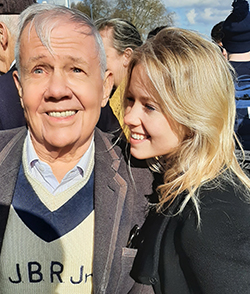
Jim Rogers and Hilton
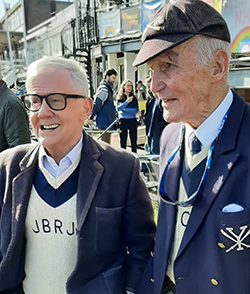
Jim Rogers ’64 and Duncan Spencer ’62
The Boat Race
April 3, 2022
The dark blue crew of Oxford, who last won the men’s race in 2017, halted their rivals’ run of three straight wins and crossed the line before Chiswick Bridge in 16 minutes and 47 seconds. The bow of the “Bill Fink” crossed the line two and a quarter lengths in front of the Cambridge shell.
Here is the Oxford crew putting the “Bill Fink” in the water before the race.

And here is the race itself.
The 1963 Yale Crew
Here is a photo of the 1963 Yale Heavyweight Crew taken from our 1964 Class Book. The photo includes Ed Trippe ’64, Harry Howell ’64, and Bill Fink ’64, all of whom subsequently rowed for Oxford. Also pictured from the Class of 1964 are Rolf Lium, Ken White, and Paul McAlenney, none of whom went on to Oxford. Rolf Lium ’64 was subsequently elected the Captain of the 1964 Yale Crew.
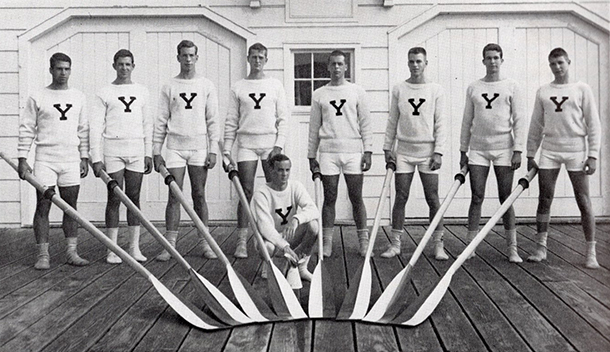
Left to right: Ed Trippe ’64 stroke, Chris Albert ’65 #7, Bill Petty ’63 #6 Captain, Rolf Lium ’64 #5, Harry Howell ’64 #4, Bill Fink ’64 #3, Peter Godfrey ’63 #2, Ken White ’64 bow, Paul McAlenney ’64 cox
In 1990 Duncan Spencer ’62, Ed Trippe ’64, Harry Howell ’64, and Bill Fink ’64 competed at Henley in the Prince Phillip Challenge Cup for men’s coxed fours. When in 1965 they had rowed for Oxford and won The Boat Race, they had constituted fully half the boat and been informally known as the “Yale four.” Twenty-five years later they reunited to race at Henley again, as told by Duncan Spencer in the following story.

Rowing Well is the Best Revenge
by Duncan Spencer ’62
The Washington Post
October 7, 1990
THE FEELING OF PANIC AND DREAD AT THE START OF a rowing race is like nothing else; it is a doom. It never becomes less with practice or the passage of time. But, like everything in rowing, it must be mastered. This, not the blinding fury of racing itself, is the worst thing.
It is very much a doom. The boats are lined up. The referee, like an executioner, intones the Gregorian chant of the starting ritual: “I shall start you with two commands — are you ready . . . row.” He sounds calm and reasonable, like the banker or lawyer he probably is, but before your heart has had the chance to thump uncertainly for three seconds, his entirely different voice, this one hysterical, booming, is shouting: “ARE YOU READY ROW.” And all you can think of is — not now, please not now!
Already you have screwed up — the blade of the oar was not squared, or the hideous screech of the starter’s voice set you off out of time. The oar digs too deep or barely scrapes the surface; before there’s time to mutter the shortest Anglo-Saxon curse, the back of the man in front of you is hurtling toward you again, almost catching your oar handle — this is hideous — late again. And someone hisses "Breathe!!" from the bow.
More than one oarsman has forgotten that important detail and as a result fought — and sometimes lost — the battle to remain conscious and functioning until the race is over.
And then the blood haze and the drum of total effort take over.
How to explain the fatal charm of rowing? What brings aging Washingtonians down to the Potomac, year after year, to strain — as they will today — through the annual Oxford-Cambridge alumni boat race? Why do we go back and back to a sport in which it hurts from the first stroke to the last, a sport guaranteed to deliver absolute agony, win or lose? And why bother!
I am having second thoughts, here in England on the Thames River before the annual Henley Royal Regatta — the premier event of international rowing — as my crew rows smoothly down the practice course, about my lifelong love-hate affair with competitive rowing, which has led me and three others to work for months to return to Henley-on-Thames twenty-five years after winning a gold medal here to compete once more, at the average age of 49.
We four Americans are undoubtedly the oldest crew at the regatta. But that’s not surprising. We are also among the smallest — the average oarsman is now inches taller than in our day.
But I am ahead of myself.
IT ALL STARTED IN 1965, WHEN ED TRIPPE, BILL FINK, Harry Howell, and I decided to compete for one of rowing’s great prizes, the Prince Philip Cup at Henley. As graduate students, we were pretty good — then. We had won the Oxford-Cambridge boat race in London in a walk as the stern four of a very strong Oxford eight-man crew, and before that had beaten a British club combination (Tideway Scullers School, containing the 1964 British Olympic silver medalists) in a practice race that one London paper called the finest ever seen on the championship course.
Then at Henley — a single-elimination contest for four-man boats — we reached the final, only to meet again the same silver medalists, and beat them in a great burn-up that set the record by twenty seconds, a record that stood for ten years.
So we came back in 1990 like four grizzled moths to the flame of glory.
It was Harry Howell’s idea. Or was it Bill Fink’s? Neither is really sure anymore, but it was at Henley that the two oarsmen met and talked about the past. Rowing has been such a thing to them, and to all of us. As they pursued their careers — the lanky Howell as a banker, the wiry, muscular Fink as an importer of Morgan cars — they returned to England often in the wonderful last weeks of June, when the regatta is always held, to the lovely course in the town thirty-five miles west of London, to the water of the Thames, which runs so sweetly between the locks, to the genteel world and the blazers and the heraldry of rowing.
And the two men met, and one said to the other, "Our anniversary is coming up. What should we do?"
The other two of the rowing team — burly, saturnine Ed Trippe, a hotel consultant, and I, a freelance writer — were not there at the birth of the idea. Nor was our former coxswain, Michael Lee, a carefree, wickedly witty Englishman who loved to gamble. Lee had disappeared from the horizons of rowing; we never located him in six months of trying. But we had the four oar pullers.
Fink and Howell made a decision: to call the others and see if the Leander Club four of 1965, the Prince Philip four, the Yale four (as we were variously called in those days) could be reassembled.
Of course, we had gone our separate ways — Fink to California, where he lived and worked and rowed; Howell and Trippe to New York, where they had continued to participate in Oxford alumni events; and I to Washington, where for a few years I had continued to row at Potomac Boat Club and then put away my oar. Until, that is, five years ago, when a group of Oxford and Cambridge graduates decided to stage a race on the Potomac between veteran oarsmen of the two universities. The event proved wildly popular, boosted from the start by the participation of then-Secretary of the Navy John Lehman, a Cambridge graduate. It had drawn me back into the narcosis of rowing, and into the dream of competing once more.
In younger rowing circles, our brand of sport is called “geezer” rowing; the ruder term is “has been or never was” rowing. But to all who participate, it has become important, a fixture of sporting life, a reminder to stay fit. And Washington’s program, led by the doughty foreign affairs consultant and CIA man Dr. George A. Carver Jr. (cox of the great Yale crew of 1949 and of the Oxford crew of 1950) is the most active of the similarly minded groups in Boston, Philadelphia, and New York.
So when the call came to return to Henley, I said yes. It had something to do with the passage of time, with proving something. But mostly it bore out my belief in the maxim of that great late athlete and mountaineer H.W. Tilman, “Strenuousness is the way of life, and sloth the way of death.”
It was at Henley, not at championship courses before and after, that we had our greatest rows. It was there that we came closest to the dream of perfection that is the secret all oarsmen hold in their hearts and the reason that keeps them driving on and on.
What is that perfection? Truly is it said that the life of action never knows itself. Because the perfection of action is impossible to reduce to words. What it is is a sensation, or a physical expansion, or a change that can only be called an exalted state, the result of a surge of adrenaline, as with the gunner who is able to lift his 500-pound gun.
In rowing, every stroke is different — and there are thousands, hundreds of thousands of strokes in a career, from the first tentative wobbling attempts, to the last flurry to edge in front in a veterans race decades later. But for every oarsman, and sometimes for whole crews, there are moments when anything seems possible. This is when the combination of individuals in the crew somehow is in complete harmony, when each stroke is close to perfect, when each man swings forward with the sure belief that acceleration can be maintained forever.
The explanation, I suspect, is rather modest. Rowing, examined as pure physics, is really very simple, a transfer of the power of legs, arms, and backs to a lever with a constant rate of slip in the water. Rowing would be simple and predictable except for the human factor. As it is, men (and women) are so differently built, so different in performance, and in mood and approach, that most crews are operating at only a portion of their true potential. In other words, if they could simply achieve what they are striving to do — namely to place the oars in the water at the exact same microsecond — and apply the power of arms, legs, and backs to them at the same microsecond, the resultant force on the boat would be astonishing.
Those oarsmen who have rowed in excellent crews know of these overdrive situations, and strive to repeat them. Most oarsmen have known a perfect stroke or two, and for some, the feeling is enough to change a life and make a normal, sane person into a rowing fanatic.
Rowing is a sport in which luck and chance play almost no part. There can be no miraculous catches, odd bounces. Seldom is there interference, and almost never does a single star (except in the single sculls) win a race. Races are won by the crew that correctly gauges its strength and spends it wisely.
We had been to these Elysian fields of effort before — in our coxed four, in our Oxford University eight, and before that at Yale. Now, we simply sought to regain the echo of that ringing bell, to say hail and farewell to that feeling — for that was all the drug we sought — just a feeling, just a few great strokes.
IT WAS AT HENLEY ON JUST SUCH a morning in 1965 that the Grail of rowing appeared to us. I remember it vividly, as do the others. We were doing starts, we were working on the lower part of that lovely, willow-lined, pasture-bordered stretch of the Thames between Temple Island and Hambledon Lock — where exactly it does not matter, except that all agree it helped (it could not hurt) that it was on holy rowing ground, on the same water where the true giants of the rowing game, the crews whose names are written in gold at the renowned Leander Club, had practiced, gone to the execution of the starting line and the fierce battle of the mile and 5/16ths, and on into rowing history.
It could not hurt that the water was cool and ruffled by a slight northeasterly breeze, or that our coach, George Plumtree, on his bicycle, with a pinch of snuff — yes snuff! — was urging us to “move a bit quicker with the shoulders, a bit quicker into it,” in his quaint London Rowing Club way. And it didn’t hurt a bit to know that ahead lay the silver medalists from Tideway Scullers, ahead in the mist of the next few days, which we would spend as oarsmen in competition do, doing two outings a day, and eating and sleeping and talking times and techniques and watching other crews — and that’s all.
And it could not have hurt that there was a certain lack of tension in the crew, a relaxed feeling that comes from fast times, from a summer on the river, from being 25 and supremely fit.
We turned the boat — or I should say Michael Lee, our coxswain, turned the boat. Michael, an Etonian and the youngest son of a lord, was the only Englishman in our crew of Yanks and was somewhat haughty about our non-Oxford coach. Michael steered the boat and straightened the slim cedar-and-pine hull with his varnished fin of a rudder and called out, “Come forward for start 10 and stride 20-are-you-ready-ROW.”
The boat took off — we had always been swift to start, but this was far different. We rowed in a trance. We could barely breathe for the speed and perfection of it. Those twenty strokes were like a great song. But no words. Bill Fink, who sat geographically near the middle of the boat (I was bow, Harry Howell two, Bill Fink three, Ed Trippe stroke, as these things are numbered), said he heard and felt the bubbles that are driven under the narrow hull of a shell when it’s going very fast — that he felt them under his own sliding seat, eighteen feet from the bow, through the eighth of an inch of varnished wood.
Each stroke was so simple, just roll up and reach for it, while the pulling part, the part photographers always love to catch — the agony part where everyone’s face is contorted — the pulling was nothing but joy, the joy of splitting wood or hitting the longest drive, a trifle compared to the music that we felt, the music of those instants of close-to-perfect rowing. Rowing like that is like coming into possession of some incredible secret whose power is immense.
As it turned out, we were to need that great secret, and soon, because in the race with the silver medalists in the final, with the whole world looking on and the august red and blue and purple faces of the rowing “heavies” and their colleagues sipping Pimm’s cup from their shaded seats, we nearly lost.
We started well against the Scullers. Henley is always a two-horse race — because of the narrowness of the river from Temple Island to Henley Town bridge — and so starting speed is enormously important. Everyone who rows there knows that more than 80 percent of the boats that are ahead at the halfway point in the race — the point called Fawley, about 3 1/2 minutes of rowing out — win the race.
This has led to a tendency of British crews to strain every nerve for an early lead, to shoot their bolt and then try to scrape home hanging on to a lead that has been dearly bought. But it is a grim truth about rowing that winning crews rarely pass their competitors. Rather, leaders falter and fall back; very few crews are able to move faster over the last quarter of a race.
What good crews try to do is “control” the race, either by taking the lead and sustaining it and responding to challenges, or by being so close to a fast-starting crew that it must literally burn out and fall back. The Scullers on paper were tougher and stronger — seasoned veterans against us schoolboys (though in truth we were all graduate students). In rowing, an athlete’s peak is not as early as in more explosive sports. So important is will and self-knowledge that a man of thirty to thirty-five can usually be expected to get the better of a man ten years younger. This is because the older man is more likely to “hang in” a bit longer, and be less discouraged by being behind at any stage.
On the other hand, our crew had excellent early speed and endurance built up over five months’ training. So our plan was easy — control the Scullers off the start and keep ahead of them. We knew — or we thought we knew — that if we were ahead with only thirty strokes left to go (thirty-six strokes is a minute’s rowing), we could call on something extra, and win.
Most oarsmen have known a particular feeling of helplessness during a race they are leading — a feeling that there is simply nothing left in the tank, that if the other crew makes a move, there is nothing they can do but let them go. It is a feeling of emptiness, almost of horror. But chances are, the losing crew feels the same pain, and the last twenty strokes come as a reprieve, and you think, “If nothing happens, we can make it.”
We knew that the Scullers would allow us no mistakes. They had a grudge against us for that practice race; and another grudge. The Scullers were unremittingly anti-Oxford, anti-Cambridge, and above all anti-Leander. “The pink brigade” was one epithet they hurled at our club’s cerise rowing colors. “Pooftas” was another. They considered themselves the salt of the earth and, above all other qualities, tough and unrelenting. They would be there until the last stroke.
We started well, grabbed half a length, and we sat there. The world of a race is a fog of furious action. You are almost blind, almost deaf, the air seems white and thick; only your eyes reach out, stabbing glances toward the enemy — are they up, are they down, are they moving?
Locked together, the two crews battled at 36 strokes per minute down the well-known markers of the course — the Barrier (about 90 seconds), Fawley, Remenham Club, the Enclosures, the Mile-and-an-Eighth. Henley was doggedly Victorian and for race reporting relied on a series of hand-operated wooden signals that symbolized the two racing crews, so as you rowed backward down the course you had the unnerving experience of seeing the mid-race standings being hoisted by men in white smocks, even as you rowed away from them.
In every race there is a time of hope. In some, it is soon over. But in this one we got to the Barrier and Fawley and extended our lead to two-thirds of a length. We wanted to break clear — which would have hurt them badly. Only the strongest and most resolute oarsmen can continue to give all when the opposition is out of sight. We could not do it. This was the crisis of the race, our inability to break clear, for subtly the initiative, the control, at first ours, was slipping just as the limits of our endurance were making themselves felt.
They say that an oarsman dies three times during a race — at the start, at the end of the first minute, and at the finish. Though no one knew it then, we were dying at Remenham Club, with about two minutes left to row. No one knew it then, but the Scullers were on the ropes as well. It was silent, that next minute, silent in spite of the coxswains’ cries for more, for ten strokes, for another few feet, silent with the roaring of lungs and the searing pressure of blood, and the karma of swinging through each stroke, almost unconscious of what was going on — except that we were clinging to our lead.
Unbidden, the thought swam through my reddened brain, the old thought that “if we can just keep doing this — nothing more — we will win this race, this race we have begun to hate . . .”
And at that moment the boat lurched. Bill Fink had crabbed — somehow failing to free his oar from the water at the end of the stroke. It threw the boat down on its side, destroyed the rhythm. We were jerked out of our trance by a fear so sharp I still recall its pang. It was the fear of chaos, of falling off the cliff, of steering into oncoming traffic, of destruction.
But it was worse than that. Losing in rowing is an absolute. Not only are you physically beaten until you can barely move, you are humiliated. There are no excuses, no if onlys. It is nobody’s fault but your own. Your responsibility is intimate and complete. To lose as a result of a blunder, a flaw in technique, a lapse of judgment would have made the humiliation bitter indeed.
Only rage and shame, those twin pitchforks from hell, could have roused us from our oxygen debt — and fear. We picked up the stroke from Ed Trippe’s flashing blade, and we put in a ten-stroke spurt of pure adrenaline that got us to the finish line two-thirds of a length ahead. “You like to play, you boys do,” said George Plumtree, many pints of beer later. “You gave me some bad moments.” BUT THIS WAS THE SUMMER OF 1990, and the bad moments had not ended.
Donald Leggett, Cambridge crew of 1964 (a year they won), stood near the tents at Leander Club as we came back weary from an outing. Like us, he was outdated, an old oarsman trying to bring back the old days through the bottom of a glass — and like some Englishmen, though not all, he had resented us in ’65 for being four Americans who had dominated the sacred Oxford-Cambridge boat race, and would never forget that in a moment of braggadocio, the crew’s wit, Miles Q. Moreland, had dubbed the Oxford eight “the crew of steel.”
Now, Leggett got his revenge: “Crew of steel — looks more like crew of rust to me!” he shouted with a guffaw, the portrait of an oarsman gone to seed, his shirt front swelling, his eye pouches green, his teeth lengthening.
We shouldered the narrow gunwale of our fiberglass four-man shell and glared at Leggett. Our rowing season had begun in February when we all, separately, had started a rigorous regimen with jogging, weights, and the resistance machines now almost universal in rowing training.
We had driven to New Haven over Yale-Harvard boat race weekend and presumed on the kindness of the Yale Crew Association to lend us oars, coxswains, boats, and equipment. In two days we had rowed four times and acquired four sets of blisters — but the important thing was that all of us were in reasonable shape and we rowed well together. Then there was the rush of work, of airline reservations, of wife persuasion, of accommodations, and suddenly we were in England, walking, as we had so many times a quarter-century before, with towels slung over shoulders, to the Leander Club boathouse.
The very center of the rowing world, the ground zero, is in the bowels of Leander Club — to be precise, in the tile-lined row of six Victorian, hardwood-seated, high-tanked, chain-flush thunderers reserved for the club’s active oarsmen. Ripe for modernization, these toilets have been preserved as if to remind all who go there of the briefness of strength, the sureness of decline, the commonality of man the animal. A malodorous place, always clean yet dank, “the bog” has been the retreat of choice for British oarsmen for as long as memory lives.
A floor above are the painted walls and gold-leaf plaques, the silver and the silk, the starched linen and the smell of gin, the bay window overlooking the bridge and the peaceful river. Leander is Britain’s best-known rowing club — and its snootiest. The four of us were admitted not because of our social credentials, of which we had none, but because we had competed in the Oxford-Cambridge boat race.
Leggett’s beery gibes were soon forgotten, as were the wary but friendly comments of Leander President Ivor Lloyd, whose spartan regime includes a sculling session every morning of the year from the club float, and others who may have suspected we were mere nostalgics.
But we weren’t. Bill Fink managed to persuade British Olympic cox Pat Sweeney to steer the four. Sweeney, as down to earth as they come, gave us increasing attention as he realized we were in the regatta, not perhaps with a chance of winning, but with a chance of proving something. For we had learned that the “draw” of positions in the single-elimination format put us against the world champion West German crew Hansa Dortmund 1898, a crew that outweighed us, was considerably taller, and at least twenty-five years per man younger.
Other entrants in the Prince Philip Cup 1990 included a Bulgarian national crew and two British National Squad crews. But on our side of the draw were the Germans, and if we beat them by some miracle in the sport of no miracles, then we would likely face the Bulgarians in the final.
We practiced on through the five days we had allotted for our training, each day gaining in fitness and speed. We were technically good (the British would have been merciless if we had not been — Leander’s locker room would have rung with gibes, snickers and silence). But we knew that we were doing well when Lloyd changed his mood from one of unfailing politeness to distinct friendliness.
Our times were coming down too, as we practiced on the course over familiar signposts, and we were encouraged by brushes with crews in lesser four-oared events. Our outings had fallen into a familiar routine — early in the morning we’d wait on the damp float at Leander for Sweeney’s weathered face to appear underneath a spike of hair and set off for the fine-tuning rows that combined hard strokes, starts, and timed pieces.
We were joined by the indomitable George Plumtree, now long retired and at the age of 78 only slightly wider and more rheumy than a quarter-century before. His snuff box was still full, and he still offered the sweet Scotch snuff he favored with his favorite query: “Have a bit of the whore’s drawers?”
From the towpath he bellowed at Trippe, “Eddie, oh Eddie, my love . . . just a bit quicker around the turn . . .”
OUR SUMMER CAME TO A CLIMAX AT 6:30 on Saturday, the day of the semifinals. Even before the start, we knew we would not finish worse than third in our event, since one of the English crews had dropped out and another had been beaten by the Bulgarians.
We had no plan. Before the start we lingered downriver, practicing our last starts. By chance, two lovers, in bucolic splendor, were disturbed by our passage nearby. We thought that a good sign — the best. The day was overcast and bright; a strong headwind made good times an impossibility. Quickly we were in the starting gate, and almost painlessly we were off with ARE YOU READY ROW. Nothing had changed from 1965 except us.
Five months we had spent preparing for little more than six minutes of rowing. Hansa Dortmund quickly took command with a burst off the start — and stayed there. From my position as bow oar I could see their stern bobbing out of the corner of my eye. Though I expected it to disappear, it didn’t. Sweeney was ecstatic at the steering ropes. “Just don’t do anything different,” he shouted over his miniature microphone. “Just keep it like this.”
As we stroked up the old course, it suddenly became clear to us (as clear as anything can ever be in the half-light of battle) that nothing was going to change — that the Germans were not going to allow us closer, and neither were they going to humiliate us. In this ballet we rowed home, without drama, without shame, and without drinking deep of the cup of humiliation — we lost by three-quarters of a length. Who knows what the verdict would have been without German forbearance?
I have known many moments of victory in rowing, and the joy is pure, purer than any other, as pure as the pain of losing is deep and long-lasting. Yet there was little pain in this defeat. Somewhere, singing in the blood was the feeling that it was better to have spent all the time and the effort, even in inevitable defeat, than to have done nothing and let the moment pass. As a former Oxford coach who had trained all of us, Ronnie Howard, put it: “It will be a good deal more difficult to do this if you wait until your 50th anniversary.”
Within an hour we had met the young German giants in the grass-floored boat tents. Sun had suddenly enlivened the day, and we took them then as guests to Leander Club, where they were clearly delighted to be — so curious were they about English “snobs,” as they gently put it — and we parted with a warm exchange of toasts.
Hansa Dortmund went on to beat the Bulgarian crew quite easily, by a wider margin, winning the Prince Philip Cup for 1990.

